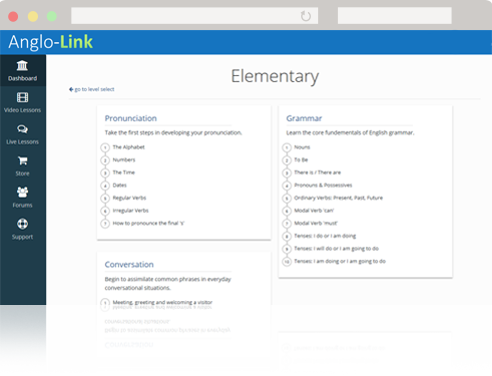Study material

What makes our self-study material so effective
Complete and relevant content
To become fluent in English, you need to master all its components: pronunciation, grammar, and vocabulary. You also need to practise all four skills: reading, writing, listening, and speaking.
We have divided your online course into three categories: pronunciation, grammar, and conversation. However, we have made sure that whichever category a particular lesson focuses on, it also allows you to review and practise relevant content form the other two categories. In this way, every lesson helps you to improve your English grammar, vocabulary, and pronunciation simultaneously. We have also made sure that you get the opportunity to practise all four skills in every lesson.
Graded
Another important aspect of a self-study course is that the content needs to be graded, going from easy to more difficult.
We have made sure that:
- The lessons in each category follow a logical sequence of easy to more difficult, with difficulty levels clearly marked for you.
- More advanced lessons revise and build on the contents of earlier lessons.
Clear explanations
We have ensured that our explanations are clear and easy-to-follow by using:
- Simple English
- Tables
- Timelines
- Colour coding
- Tips & notes
Meaningful examples
We have made sure that our example phrases and sentences:
- Easily clarify the point you are learning.
- Include useful daily English expressions.
- Perfectly match the language level you are studying.
What do I learn in each type of lesson?
Pronunciation
In pronunciation lessons, you learn about the sounds, stress patterns, and intonation patterns of Standard British English (Received Pronunciation). Understanding the sound system of the English language is essential in developing good listening skills so you can understand native speakers, movies, news, and other broadcasts in English. You can then use these resources to expand your active vocabulary. It is also important for you to develop a clear pronunciation yourself, and our self-study course gives you many opportunities to actively work on your own pronunciation.
Grammar
In Grammar lessons, you learn all the important grammatical structures in English. Mastering these is necessary for writing English fluently. A good knowledge of grammar also improves your reading and listening skills. It is true that absolute grammatical accuracy is not essential for speaking fluently. However, a good knowledge of grammatical structures can definitely increase your self-confidence. When we do not know the grammar rules, we may think we are making too many mistakes, and we can lose our confidence to speak English in front of others. On the contrary, when we know the rules, we are able to recognise and correct our mistakes, and this is a great boost to our self-confidence.
Conversation
In conversation lessons, you focus on expanding your range of vocabulary and expressions in a variety of everyday contexts. Learning English vocabulary in situational dialogues reduces the need for translation and ensures that you can use the vocabulary you learn reflexively. All the situational dialogues in the course have been voice-recorded so you can improve your listening skills and pronunciation at the same time as you learn new vocabulary and expressions.


 العربية
العربية Français
Français Português
Português 中文
中文 हिंदी
हिंदी Español
Español Italiano
Italiano